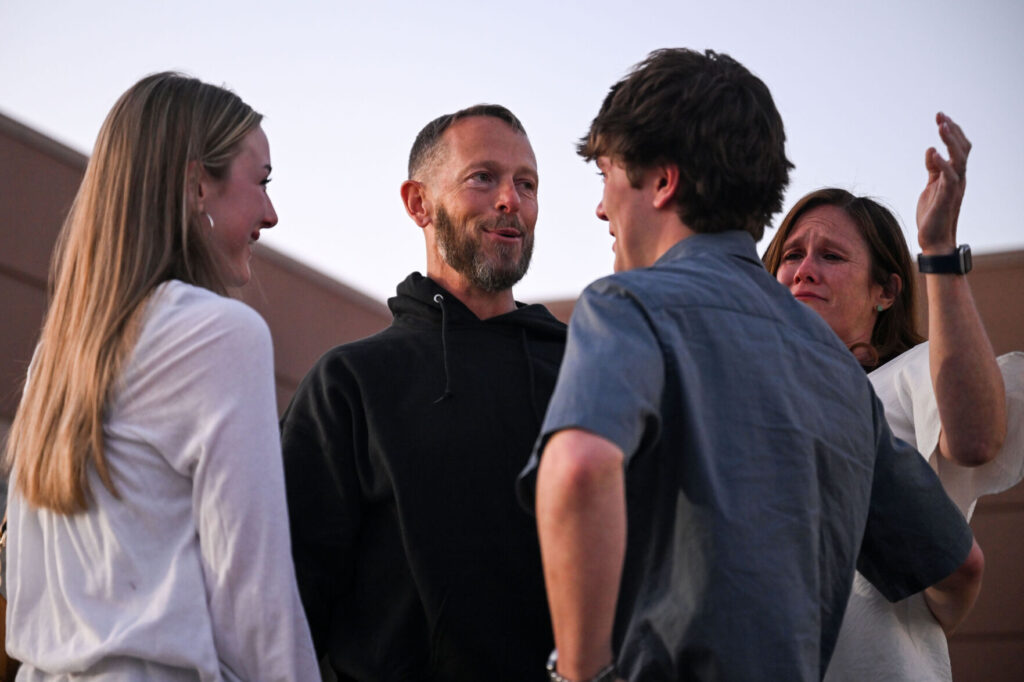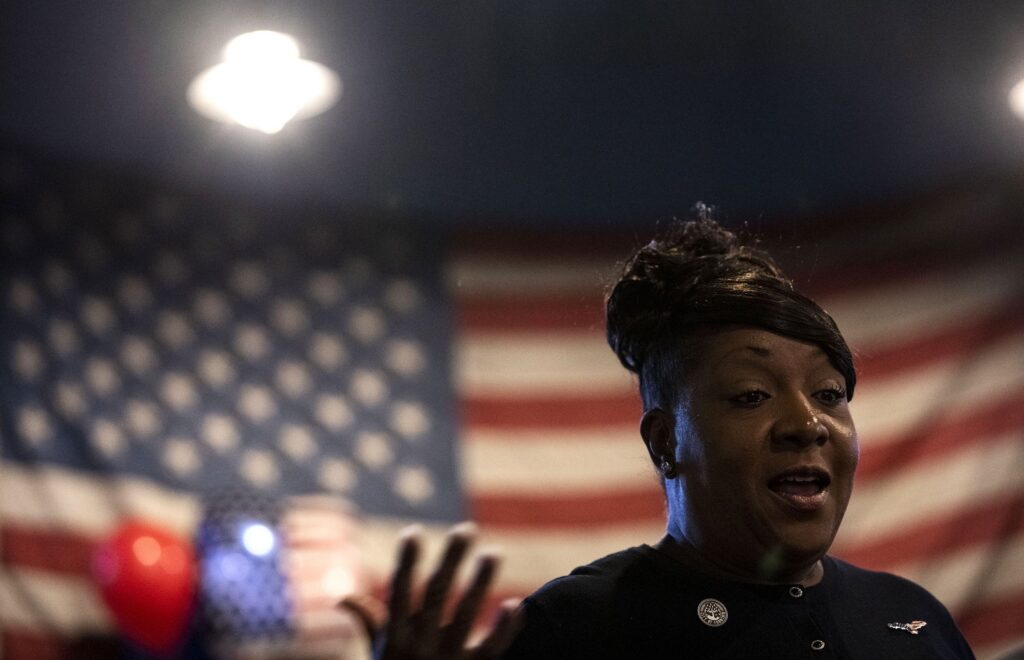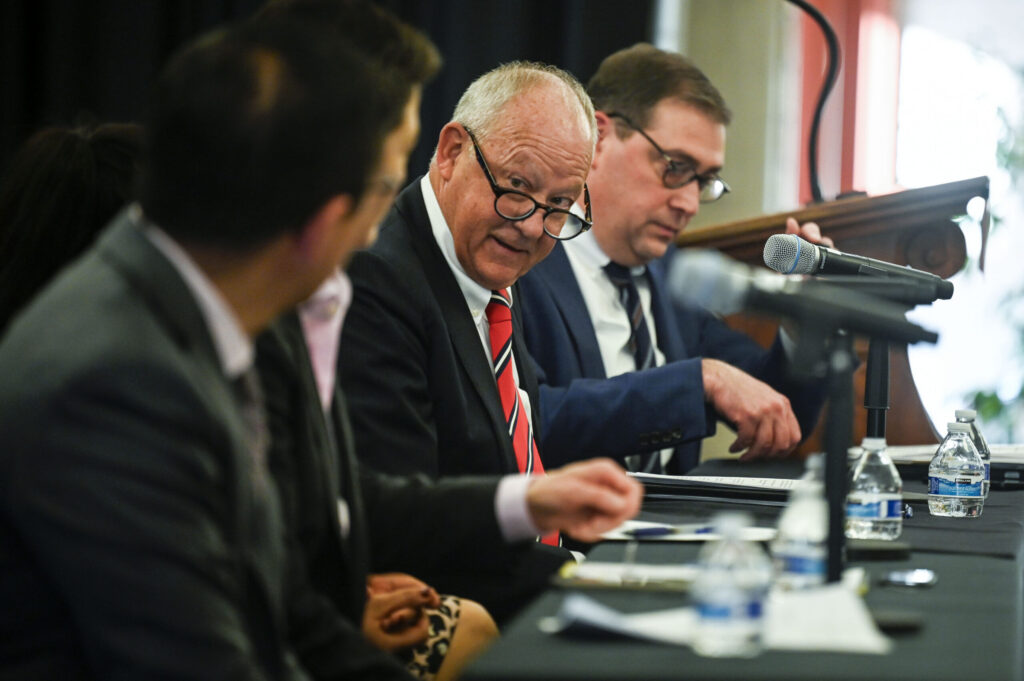Colorado Supreme Court justice warns AG’s office: Watch your arguments on appeal
In one of the final oral arguments prior to the Colorado Supreme Court’s summer recess, one justice delivered an unusual and specific message to the Colorado Attorney General’s Office about a technical legal issue that has substantial ramifications in criminal appeals.
Normally, a lawyer must raise an argument in a lower court to “preserve” it for appeal, although there are rare occasions in which the lack of an objection can nonetheless result in an appellate win. If attorneys do not preserve an issue adequately, the appellate court can deem it “waived.”
Because criminal appeals are almost always initiated by the defendant, the prosecution has the first opportunity to claim waiver in responding to the appeal.
Enter Justice Richard L. Gabriel.

FILE PHOTO: Colorado Supreme Court justice Richard L. Gabriel asks a question during oral arguments of the Arnold R. Martinez v The People of the State of Colorado case during Courts in the Community on Thursday, Oct. 26, 2023, at Gateway High School in Aurora, Colo. (Timothy Hurst/Denver Gazette)
“I hope you’ll talk to your colleagues: Be aware of raising waivers on the other side so quickly. I’ve made it clear in writing on this court that I’m concerned how quickly we’re all arguing waiver,” he told the government’s attorney on June 17. “Be aware of that because it may come back to bite you.”
“I understand Justice Gabriel’s frustration. Most answer briefs I receive from the attorney general’s office include assertions that issues have been waived,” said Antony Noble, a defense attorney who handles criminal appeals. “They also consistently include assertions that claims have been abandoned or that arguments are perfunctory and conclusory and should not be addressed.”
In the case before the Supreme Court, People v. Eugene, the Court of Appeals ordered a new trial after finding a man was interrogated in custody without receiving a Miranda warning. The prosecution then appealed to the Supreme Court.
The defendant was the first to claim the attorney general’s office had committed waiver because of its “astonishingly thin” argument to the Court of Appeals about the alleged Miranda warning violation. Now, before the Supreme Court, the prosecution elected to provide a robust argument that did not exist at the appeals court.
“The State waived (or conceded) arguments it attempts to assert for the first time in this Court,” wrote public defender Emily Hessler on behalf of defendant Terrence Kenneth Eugene.

FILE PHOTO: Students from Pine Creek High School ask the justices of the Colorado Supreme Court questions after watching them hear arguments from two cases in the high school auditorium on Nov, 17, 2022. Pictured from left to right are Justice Richard L. Gabriel, Justice Monica M. Márquez, Chief Justice Brian D. Boatright, Justice William W. Hood III and Justice Melissa Hart.
Senior Assistant Attorney General Gabriel P. Olivares countered there was no reason why the prosecution “cannot explain their position in more depth in later proceedings.” He then accused Hessler of bringing up an argument to the Supreme Court — Eugene’s race was a factor to consider — that the defense had similarly omitted earlier.
Gabriel, addressing Olivares, was concerned the attorney general’s office was flagging a new argument from the defense while at the same time presenting its own detailed contentions never given to the Court of Appeals.
“It seems inconsistent to me,” Gabriel said. “This is troubling. This is not the way it’s supposed to happen. And both sides probably have some fault here.”
He concluded: “Be careful of the arguments you raise on waiver. I say that as a courtesy and with kindness. But it’s troubling to me how often we hear waiver on the other side.”
A spokesperson for Attorney General Phil Weiser had no comment about Gabriel’s remarks. Gabriel declined to elaborate further to Colorado Politics.
Gabriel has lobbed previous criticism against the attorney general’s office about its questionable assertions that defendants waived arguments on appeal.
In a 2020 dissent, Gabriel noted the office agreed in the Court of Appeals that a defendant had preserved his argument about inconsistent verdicts, but then changed course at the Supreme Court and now insisted the argument was waived. Even the court’s majority acknowledged the prosecution failed to explain its “diametrically opposed position.”
“It is unclear to me,” Gabriel wrote, why the government believes “they can concede preservation of an issue in the court of appeals and then take the opposite position in this court (apparently not recognizing the irony …).”
“Needless to say, arguments regarding waivers,” he cautioned, “do not operate solely against criminal defendants; they work both ways.”

Justice Richard L. Gabriel listens during oral arguments at the Colorado Supreme Court’s “Courts in the Community” event on May 9, 2024 at Central High School in Pueblo. (Photo by Jerilee Bennett, The Gazette)
Mesa County District Attorney Daniel P. Rubinstein said he is sympathetic to the idea that issues should be properly raised before they reach the Supreme Court for review. However, he noted appellate lawyers often can spend more time with a case and see a better argument than an attorney in the lower courts.
“Generally, appellate courts are there to decide if a trial court got the law wrong, and lawyers should be giving trial courts the opportunity to get it right by citing the applicable facts and cases that are needed,” Rubinstein explained. “That said, injustice occurs when the courts decline to consider the facts and law that are applicable only because a trial lawyer didn’t find the correct case or make the argument perfectly.”
Timothy R. Bussey, a criminal defense attorney, characterized the attorney general’s conduct in the Eugene case as “hypocrisy” in arguing the defendant waived an issue while simultaneously pursuing its own potentially waived argument.
“As a former Court of Appeals judge, Justice Gabriel is keenly aware of the dynamics of cases in the Court of Appeals,” he said. “In the Court of Appeals, where most criminal appellate cases are born and die, the attorney general is often successful by arguing waiver.”
Noble, the criminal defense lawyer, added that if an appellate court finds his client waived an argument and declines to address it, he may advise the defendant to pursue a claim of ineffective assistance of counsel, which prolongs the proceedings.
“It does seem a phenomenal waste of time for the attorney general’s office to argue waiver and abandonment to the extent that they have been arguing it,” he said. “I am glad that Justice Gabriel identified this problem and admonished the attorney general’s office.”










